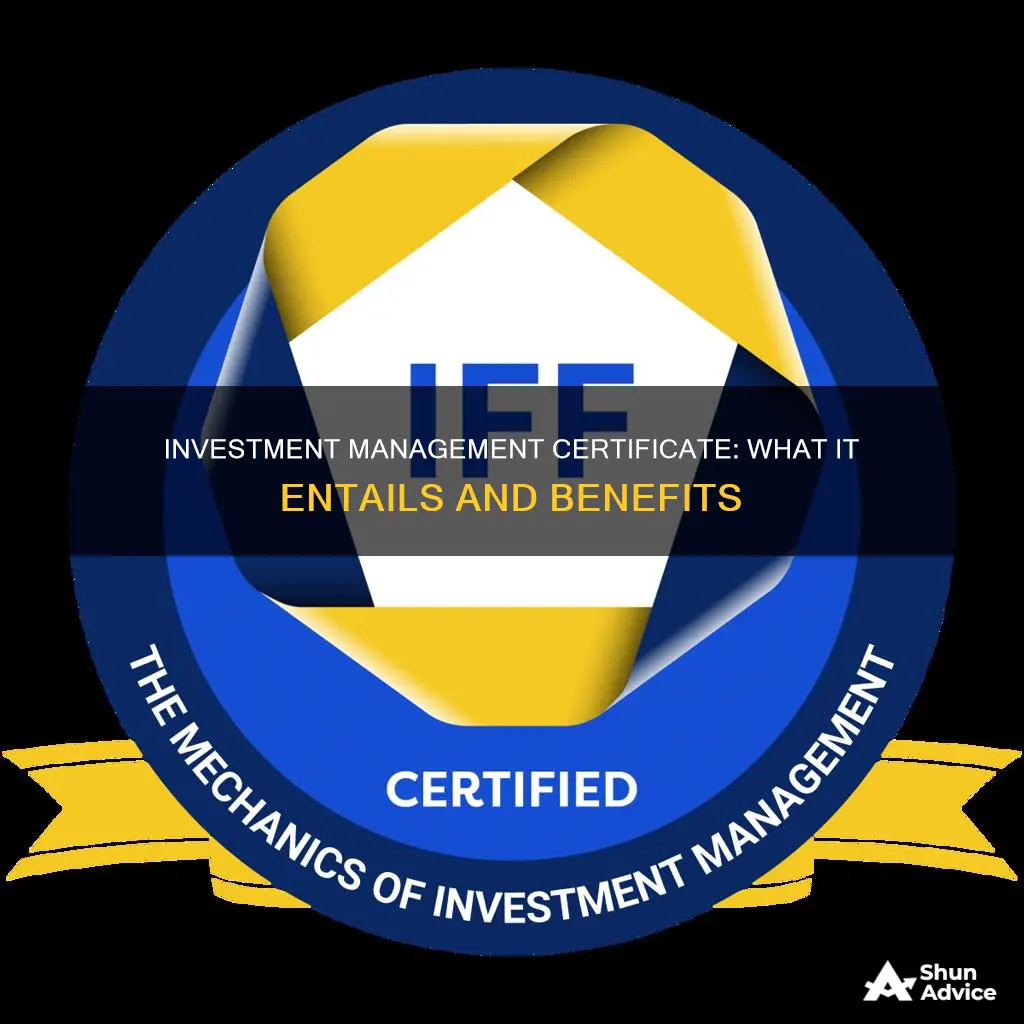
The Investment Management Certificate (IMC) is a qualification for investment professionals. It is widely recognised as the entry-level qualification for the investment profession and is often quoted as a prerequisite for posts in investment management companies. The IMC covers two units: the investment environment and investment practice. The former covers topics such as the regulatory environment, markets, taxation and client objectives, while the latter covers topics such as financial instruments, portfolio management, accounting, economics and statistics. It is recommended that candidates spend 80 hours studying for the Investment Environment unit and 120 hours for the Investment Practice unit. The IMC is a useful qualification for anyone working in an investment-related role, including portfolio managers, research analysts, risk managers and relationship managers.
| Characteristics | Values |
|---|---|
| Qualification type | Entry-level qualification |
| Field | Investment management |
| Target audience | Investment professionals, graduates, career changers, investment support staff |
| Format | Two-part, computer-based testing |
| Topics covered | Economics, accounting, investment practice, regulation, ethics, financial markets, institutions, client advice, taxation, quantitative methods, microeconomics, macroeconomics, equities, fixed income, derivatives, alternative investments, portfolio management, investment products, investment performance measurement |
| Study hours | 200-240 hours |
| Pass mark | 65-75% |
| Pass rate | 65-80% |
| Cost | £520 for both exams |
| Additional costs | £125-£135 for the official training manual |
| Retakes | £250 for Unit 1, £270 for Unit 2 |
| Recognition | Well-recognised in the UK, can be taken globally |
| Benefits | CV booster, stepping stone to global professional qualifications, improves knowledge of investment products and industry, enhances employability and earning potential |
What You'll Learn

Investment Environment
The Investment Environment is one of the two units that comprise the Investment Management Certificate (IMC) exam. The other unit is Investment Practice. The Investment Environment unit covers topics including the regulatory environment, markets, taxation and client objectives. It is recommended that candidates spend 80 hours studying for this unit, compared to 120 hours for the Investment Practice unit.
The Investment Environment unit focuses on providing a broad introduction to the investment environment, covering how financial markets work, ethics, client advisory, and the UK tax, legal and financial regulatory system.
The Investment Management Certificate is the benchmark entry-level qualification for UK investment professionals. It is used by leading investment management firms to demonstrate employee knowledge and competence for regulatory purposes. It is also used by individuals working across all areas of the sector to develop their careers. The qualification is well-recognised within the industry as an indication of a thorough understanding and knowledge of investment management.
Understanding the Portfolio Investment Process: A Comprehensive Guide
You may want to see also

Investment Practice
- Economics (Micro and Macro)
- Accounting
- Quantitative Methods
- Asset Classes (Equities, Fixed Income, Derivatives, Alternative Investments)
- Investment Theory, Management and Measurement
- Financial Instruments
- Portfolio Management
- Financial Instruments
- Accounting
- Economics
- Statistics
The Investment Management Certificate (IMC) is a benchmark entry-level qualification for investment professionals in the UK. It is used by leading investment management firms to demonstrate employee knowledge and competence for regulatory purposes. It is also used by individuals working across all areas of the sector to develop their careers. The IMC is well-recognised within the industry and is often quoted as a prerequisite for posts in investment management companies.
The IMC is recommended to anyone working in an investment-related role, including portfolio managers, research analysts, risk managers, relationship managers, wealth managers, sales and distribution, operations, and IT/technology. It is also suitable for anyone looking to level up their basic knowledge in investment management, including fresh graduates, career changers, and investment support staff.
The IMC is a valuable qualification for those at the beginning of their careers in finance and investment management. It can boost one's CV, kickstart their career in investment management, and pave the way for further finance designations. It is also a stepping stone to global professional qualifications, such as the Chartered Financial Analyst (CFA) program.
Morgan Stanley's Investment Management Options: Exploring the Choices
You may want to see also

Financial Markets and Institutions
The Investment Management Certificate (IMC) is a qualification for those looking to enter the investment profession. It is recognised by the fund management industry as the entry-level qualification of choice and is often quoted as a prerequisite for posts in investment management companies. The IMC is split into two units: Investment Environment and Investment Practice.
Unit 1: Investment Environment
This unit covers the following topics:
- Financial markets and institutions
- Ethics and investment professionalism
- Regulation of financial markets and institutions
- Legal concepts
- Client advice
- Taxation in the UK
Unit 2: Investment Practice
This unit covers the following topics:
- Quantitative methods
- Microeconomics
- Macroeconomics
- Accounting
- Equities
- Fixed income
- Derivatives
- Alternative investments
- Portfolio management
- Investment products
- Investment performance measurement
The Investment Environment unit provides an overview of the financial markets and the regulatory environment in which they operate. It covers the different types of financial institutions, such as banks, investment banks, and brokerage firms, and the products and services they offer. This unit also explores the legal and ethical frameworks that govern the financial markets, including regulations such as anti-money laundering, know-your-customer (KYC), and data protection.
The Investment Practice unit focuses on the practical application of financial knowledge in areas such as portfolio management and investment analysis. It covers the different types of investments, such as equities, bonds, derivatives, and alternative investments, and the techniques used to analyse and value them. This unit also includes topics such as accounting, economics, and statistics, which provide a foundation for understanding financial statements and analysing economic data.
The IMC is a well-recognised qualification in the UK financial industry and is often seen as a stepping stone to more advanced qualifications, such as the Chartered Financial Analyst (CFA) program. It is designed for anyone working in an investment-related role, including portfolio managers, research analysts, risk managers, and wealth managers. The IMC provides a solid foundation in financial markets and institutions, equipping candidates with the knowledge and skills needed to succeed in the investment profession.
Fidelity's Investment Management: Is It Right for You?
You may want to see also

Ethics and Investment Professionalism
The IMC qualification is split into two units: Investment Environment and Investment Practice. The Ethics and Investment Professionalism topic falls under the Investment Environment unit, which covers the regulatory environment, markets, taxation and client objectives.
The Investment Environment unit focuses on providing candidates with a broad introduction to the investment environment, including how financial markets work, ethics, client advisory, and the UK's tax, legal and financial regulatory system. The unit also covers the importance of ethical behaviour in banking and how it can be encouraged through codes of ethics, regulation and good leadership.
The IMC qualification is a great way for those new to the industry to boost their CV and differentiate themselves from other candidates. It is also a stepping stone to global professional qualifications, such as the Chartered Financial Analyst (CFA) program.
S-Corp Savings: Investing for Growth and Security
You may want to see also

Regulation and Legal Concepts
The Investment Management Certificate (IMC) is a qualification that is widely recognised in the UK as the benchmark entry-level qualification for investment professionals. It is also a stepping stone to global professional qualifications, such as the CFA program. The IMC is split into two units: Investment Environment and Investment Practice. The former covers topics including the regulatory environment, markets, taxation and client objectives, while the latter covers financial instruments, portfolio management, accounting, economics and statistics.
Unit 1 of the IMC exam focuses on the introduction to financial markets, alongside legal, taxation, regulatory and ethical considerations required in client investment advisory. Regulation and legal concepts are essential components of Unit 1. This unit consists of 85 questions and candidates are given 1 hour and 40 minutes to complete it.
The regulation of financial markets and institutions is a key topic within Unit 1 of the IMC. This covers the legal and regulatory framework within which financial markets and institutions operate. Candidates are expected to understand the role of regulatory bodies, such as the Financial Conduct Authority (FCA) in the UK, and the rules and regulations that govern the industry. This includes regulations such as the Financial Services and Markets Act 2000, the Markets in Financial Instruments Directive II (MiFID II), and the Senior Managers and Certification Regime (SMCR).
Legal concepts are also an important part of Unit 1. Candidates are expected to understand the legal framework that applies to the investment industry, including contract law, tort law, and company law. This includes understanding the different types of contracts, the elements of a valid contract, and the rights and obligations of the parties involved. Candidates should also be familiar with the concept of tort law, including negligence and breach of duty, and how it applies to the investment industry. Additionally, knowledge of company law, including the different types of business structures and the rights and responsibilities of directors and shareholders, is essential.
The interaction between regulation and legal concepts is crucial. For example, regulatory requirements may be enforced through legal means, such as fines or other penalties for non-compliance. Understanding the legal implications of regulatory breaches is important for investment professionals.
In addition to the regulatory and legal concepts covered in Unit 1, the IMC also touches on these topics in Unit 2. Unit 2 focuses on the application of investment practice and includes topics such as accounting, economics, and portfolio management. While the focus is primarily on the practical aspects, there are regulatory and legal considerations that come into play. For example, when discussing portfolio management, candidates should be aware of regulatory requirements such as know-your-customer (KYC) and anti-money laundering (AML) regulations. Additionally, legal concepts such as fiduciary duty and the types of legal structures used for investment funds may be covered.
Overall, the IMC provides a comprehensive introduction to the regulatory and legal concepts that are fundamental to the investment industry. By obtaining the IMC qualification, individuals can demonstrate their understanding of these concepts and their ability to apply them in a practical context. This knowledge is essential for anyone seeking a career in the investment profession and provides a strong foundation for further qualifications and specialisation.
Building an Investment Portfolio: A Comprehensive Guide
You may want to see also
Frequently asked questions
The Investment Management Certificate (IMC) is a qualification for those looking to enter the investment profession. It is recognised by the fund management industry as the entry-level qualification of choice and is often quoted as a prerequisite for posts in investment management companies.
The IMC is split into two units: Investment Environment and Investment Practice. Investment Environment covers the regulatory environment, markets, taxation and client objectives. Investment Practice covers financial instruments, portfolio management, accounting, economics and statistics.
The IMC is a good way to demonstrate knowledge and competence for regulatory purposes. It is also a powerful CV booster for graduates looking to break into the investment management sector. It is a stepping stone to global professional qualifications, such as the CFA program.







